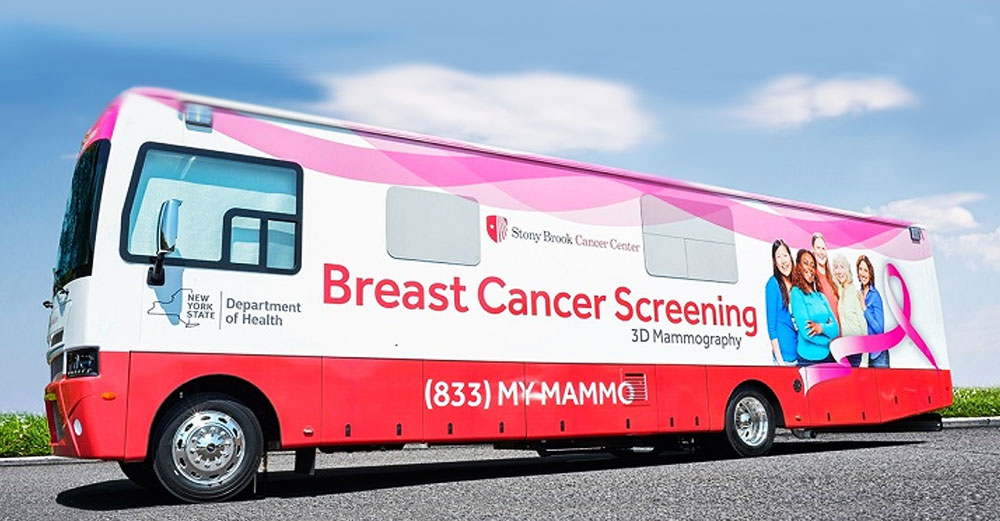
Studies show that about one in eight woman will develop breast cancer over the course of their lifetime. It is a disease that is much too common to the average person and family. According to the Centers for Disease Control and Prevention, breast cancer is the second most common form of cancer in women, behind some forms of skin cancer.
October is Breast Cancer Awareness Month, and across the SUNY system, researchers and healthcare professionals are working to help women prevent, diagnose, and treat the disease. Our talented experts have long been at work in this field. Here we’ve gathered just a few things taking place now at SUNY schools to advance our treatment and understanding of this disease.
A Better Screening Tool
The National Institutes of Health has awarded the University at Buffalo a four-year $1.4 million grant to develop a portable breast imaging system that improves breast cancer screening for women with dense breasts.
According to the National Cancer Institute, nearly half of all women over age 40 have dense breasts, which contain more glandular and connective tissue compared to fat. Women with dense breasts are twice as likely to develop breast cancer compared to women with mostly fatty breast tissue.
The new technology is called a dual scan mammoscope, and combines light and ultrasound technology to improve screening. In women who have dense breast tissue, traditional mammograms have accuracy rates as low as 62 percent.
A Potential Role for Vitamin D
At the University at Albany, Dr. JoEllen Welsh is researching the impact of vitamin D on breast cancer cells, in the hopes of developing new treatments for women with triple negative breast cancer, a form of the disease that is especially difficult to treat.
Triple negative breast cancers account for about 15 percent of all breast cancer cases. According to the American Cancer Society, they are more common in women under age 40, African-American women, and women who have the BRCA1 mutation. These cancers tend to grow and spread faster, and have a worse prognosis.
Like other cancer cells, breast cancer cells exposed to vitamin D undergo a cell death process. “Our studies suggest vitamin D reduces the hallmark behaviors of cancer cells, reverting them to act more like normal cells,” says Welsh, an Empire Innovation professor in the School of Public Health. “My lab is working to identify the processes that vitamin D trigger to alter cancer cell behavior.”
Her current five-year project, which is funded by the NIH, is studying vitamin D and triple negative breast cancer, an aggressive subtype of breast cancer that does not have the
three common targets for the drugs typically used to battle other types of breast cancer. This means that there are fewer specific drugs for triple negative breast cancers, and standard treatments like radiation and chemotherapy are largely ineffective.
“We have found that triple negative breast cancers retain the vitamin D receptor, and that these cancer cells can be regulated by vitamin D,” Welsh says. “We have identified some pathways that cause these cancers to be more aggressive, and we’ve found that vitamin D blocks the activity of these pathways. Now we’re trying to understand the specific vitamin D targets in these cancer cells to optimize future treatments.”
Taking Mammograms to the Community
Since its launch in 2018, Stony Brook Medicine’s Mobile Mammography Van has provided state-of-the-art 3D digital mammography exams throughout Long Island. To date, 2,668 women have been screened through the mobile unit, leading to early detection of breast cancer, the diagnosis of high-risk lesions, and many saved lives.
The custom-designed 40-foot van was obtained through a grant from the New York State Department of Health and expands the work of the Stony Brook University Cancer Center. The no-cost screenings to women aged 40 and up, are performed by NYS registered radiologic technologists with advanced training in mammography. Mammography images are read by board-certified radiologists at Stony Brook Medicine.
The Mobile Mammography Van has traveled throughout Suffolk and Nassau counties to key locations, including businesses, senior centers, healthcare facilities, condominium complexes for seniors, community organizations, and churches.
When it’s not on the road, the mobile unit has been located adjacent to Stony Brook’s Carol M. Baldwin Breast Care Center. The van has provided additional mammogram appointments, which has helped enabled social distancing and added time between appointments that are required during the pandemic. With mammographies available in both locations, women are able to schedule their exams without delays.
To schedule your on-the-van mammogram or to learn more about the Stony Brook University Cancer Center, call (833) MY-MAMMO or visit cancer.stonybrookmedicine.edu/Patients/MammoVan



